![]()
|
S
W Dean |
Location and period of operation:
|
S
W Dean |
Burslem |
1904 |
1910 |
|
Earthenware manufacturer at the Newport pottery, Burslem, Stoke-on-Trent, England
|
Formerly:- Edge, Malkin & Co (1871-1903)
Subsequently:- Deans (1910) Ltd (1910-1919)
 |
S.W. Dean Ltd. -
Registered capital £100, in £1 shares. |
notice of incorporation (which took place in April 1906)
The Pottery Gazette - September
1, 1906
Newport Lane, Middleport
Burslem

Dean, S. W., earthenware &
white granite and vitreous
manufacturers, Newport
Pottery
from..... 1907
Staffordshire Sentinel
'Business Reference Guide to The Potteries, Newcastle & District'
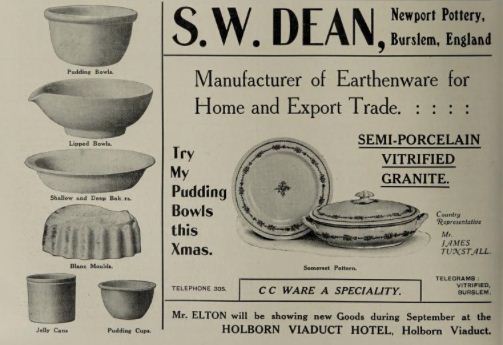 S. W. Dean, Newport Pottery, Burslem, England Manufacturer of Earthenware for Home and Export Trade Pottery Gazette - October 1908 |
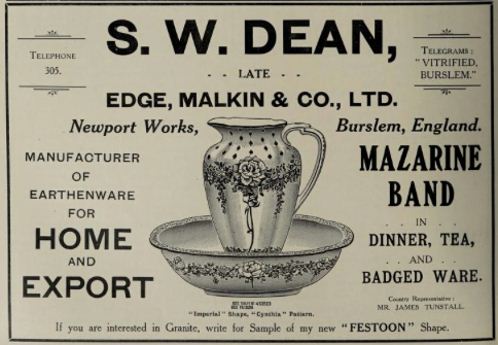 S. W. Dean, Newport Pottery, Burslem, England late.. Edge, malkin & Co. Ltd. Manufacturer of Earthenware for Home and Export Trade Pottery Gazette - November 1908 |

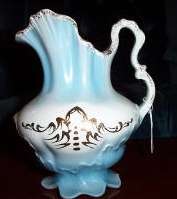
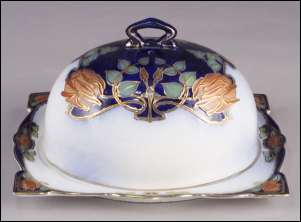
examples of S W Dean ware
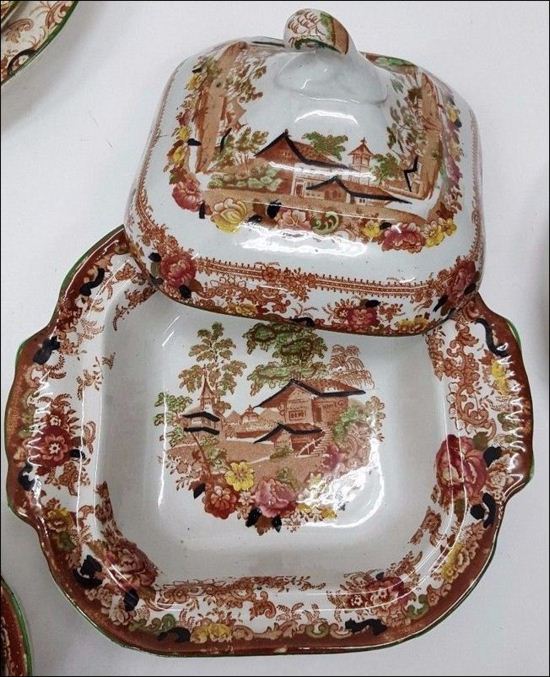 tureen & lid - Genevese pattern, brown transfer with hand colouring this pattern was also produced in a blue monocrome |
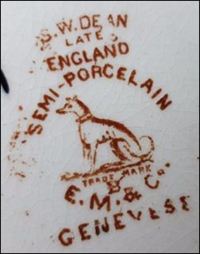 S. W. DEAN LATE E. M. & Co B England Semi Porcelain [mark referring
to the earlier |
GENEVESE is the pattern name
- it was originally produced by
Edge,
Malkin & Co
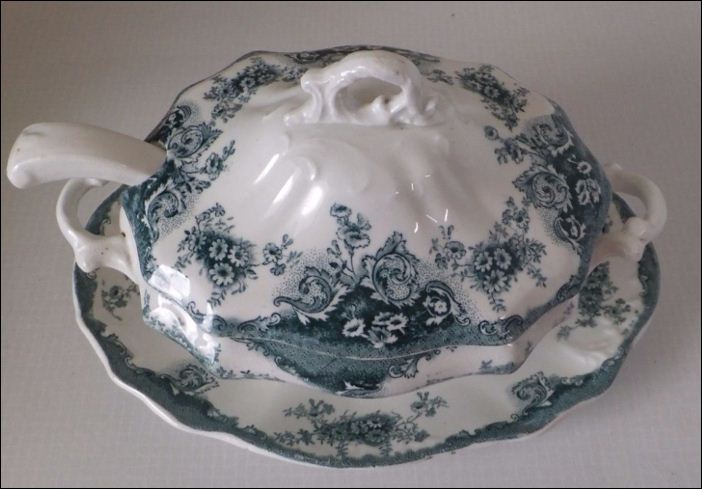 tureen with base, lid & ladle in the Marlborough pattern |
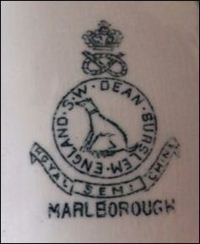 S W DEAN BURSLEM ENGLAND Royal Semi Porcelain Marlborough
is the pattern name
|
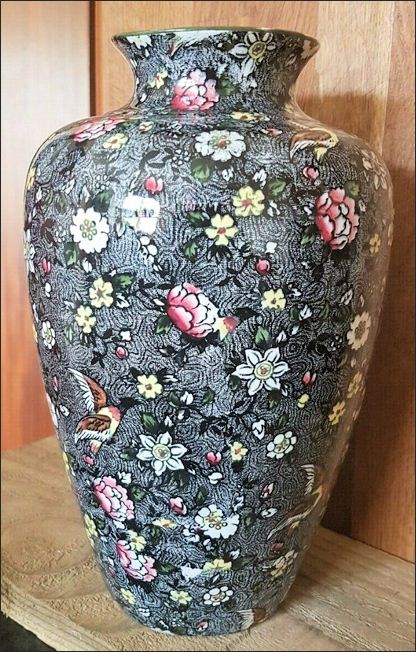 vase in the Arts & Crafts style |
|
|
Marks used on ware for identification: Samuel Webster Dean was the chairman of the previous company - Edge, Malkin & Co. In 1904, after the closure of Edge, Malkin & Co he continued the business as S W Dean. Early marks of S.W. Dean incorporated a reference to 'Late E.M. & Co' or 'Late Edge, Malkin & Co'. These marks also used the Edge, Malkin registered trade mark of a greyhound. S.W. Dean also continued patterns that were originally produced by Edge, Malkin. Marks which have 'DEANS' instead of S.W. Dean are those of the successor company Deans (1910) Ltd |
 S. W. DEAN LATE E. M. & Co B England Semi Porcelain the letter 'B' is for BURSLEM - the town where the factory was located |
|
marks referring to the previous company of Edge, Malkin & Co
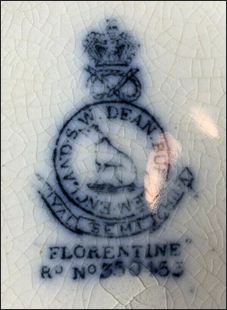 the pattern FLORENTINE was first registered and produced by Edge, Malkin & Co The registration number shows that it was registered on the 9th December 1899 |
 S W DEAN BURSLEM ENGLAND Royal Semi Porcelain
|
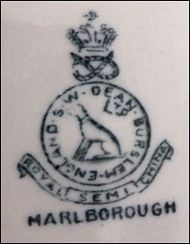 S W DEAN Ltd BURSLEM ENGLAND Royal Semi Porcelain marks with 'LTD' are
|
These marks continue to use the
mark of a greyhound. Edge, Malkin registered this as a trade mark in 1873
The marks also incorporate a Stafford Knot
with a Crown above

S W DEAN Ltd
BURSLEM ENGLAND
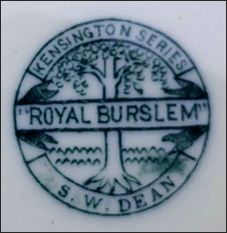 "Royal Burslem" was a brand name used by S.W. Dean |
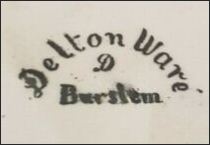 Delton Ware D Burslem
|
- click for more information on the Newport works -
|
Report of Bankruptcy
Proceedings DEAN, SAMUEL WEBSTER, earthenware manufacturer, Middleport, Burslem, Stafford. This debtor attended at the Town Hall, Hanley, on July 19 for his public examination before Mr. Registrar E. Tennant. A receiving order was made on May 27, on a creditor’s petition. The debtor’s affairs showed that the gross liabilities amounted to £29,359 6., and £10,220 16s. 11d. was expected to rank for dividend. The assets amounted to £278 18s. 9d., leaving a deficiency of £9,941 18s. 2d. The Official Receiver, in his observations, explained that having regard to the debtor’s various transactions, which were involved and somewhat complicated, and to further information which had been required, some delay had taken place in lodging the statement of affairs. At the first meeting of creditors, Mr. F. S. Salmon, Oxford-street, London, was appointed trustee of the estate, with a committee of inspection. The debtor had been adjudged a bankrupt. The examination was conducted by the Official Receiver (Mr. F. T. Halcomb). Mr. E. W. Hollingshead appeared for the trustee and petitioning creditor, Mr. R. P. Llewellyn for Mrs. and Miss Dean, mother and sister of the debtor; Mr. C. H. Norris, for the trustees of the debtor’s marriage settlement, and Mr. H. W. Worthington for creditors. Mr. F. W. Harris watched the interests of the debtor. The debtor, in reply to the Official Receiver, said that at the date of the receiving order the total amount of his liabilities was £10,220 16s. 11d., and he disclosed assets to the value of £330 10s. For many years past he had carried on business at Burslem as an earthenware manufacturer. He commenced manufacturing in his own name in 1892, and in January, 1904, he entered into partnership with Donald Macdonald, and Isaac Allman, under the style of the Lodge Brick and Tile Co., Trent Vale. The capital provided by him was £500. That sum he borrowed from the United Counties Bank, for some time known as the Birmingham and District Bank. In 1905 he sold out his interest in that concern for £250 to a Birmingham man, whose name he could not recall. In October, 1904, debtor entered into a partnership with Mr. W. S. M. Edge, his father-in-law, to carry on business under the style of Edge, Malkin & Co., at the Newport Pottery, Burslem. The capital to be provided by him was £500, and a second £500 was to be provided by him in twelve months. The first £500 was paid on the completion of the partnership arrangement, the money being lent him by his father, the late Mr. Arthur Dean. The second £500 was not found. When an investigation was made it was found that the financial affairs of the concern were not as represented in the schedule prepared by the firm itself. Between 1904 and 1909 debtor paid in £1,500 obtained from shares in the Sneyd Colliery Company. That money was advanced him on loan. In July, 1909, a company was formed under the style of Edge, Malkin & Co., for the purpose of carrying on the business of the Newport Colliery. The capital of the company was £35,000, divided into £1 ordinary shares. The debtor was to receive £4,616 - £500 in fully-paid preference shares, and £4,116 in fully-paid £1 ordinary shares. The company went into liquidation on April 29, 1902. Mr. Clarke was appointed receiver, and on Sept. 30 of the same year, debtor took over from the receiver the assets belonging to the company, estimated to represent £12,519. He also took over the liabilities - £6,463. He continued the business on the same premises up to April, 1909. Further capital to the extent of between £6,000 and £7,000 was introduced by him between October, 1902, and April, 1909. In April, 1906, a company was formed under the style of S. W. Dean, Ltd., with the object, amongst others, of acquiring and carrying on his business upon the same premises as an earthenware manufacturer. The company was registered, but as a matter of fact it lay dormant until the agreement for sale and purchase was executed in March, 1909. The consideration was £12,000, divided into 8,000 £1 fully-paid shares, and £4,000 in cash, the company undertaking to pay his debts, existing on, or incurred since, June, 1908. There was a large surplus of capital, and they took the opportunity to write some of it down, in order to stand on a proper financial basis. Questioned upon this matter the debtor stated that the capital was reduced by £8,000, as it was considered it would be prudent from a financial point of view, to write down the assets to a considerable extent. Asked if having regard to the fact that in 1906 there was a loss of £1,835, he was justified in drawing a sum of £1,623, the debtor replied that he considered he was justified in so doing, having regard to the fact that he had put £4,000 more into the concern.
Examined as to his father's will, he stated that the major part part of his father's property consisted of 3,667 £5 shares in the Sneyd Colliery Co. His father died in 1897, and he had sold the moiety of shares to which he was entitled. The official Receiver: As a matter of fact the shares belonging to your mother and sister have also been sold by you. Debtor: With the exception of 229 shares, yeas. The debtor added that he executed a declaration of trust in May, 1910. It was made between himself, his mother, and his sister, and stated, amongst other things, that the whole of the colliery shares had been transferred to his (debtor's) name. The inquiry was adjourned until August 24. |
Questions, comments, contributions? email: Steve Birks